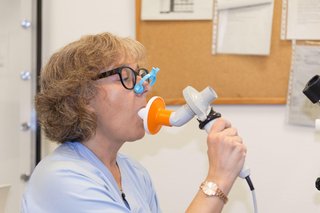Spirometry is a test used to diagnose and monitor lung conditions including:
- asthma
- chronic obstructive pulmonary disease (COPD)
- cystic fibrosis
- pulmonary fibrosis
You'll breathe into a small device called a spirometer.
A spirometer measures how well air moves in and out of your lungs during forced breathing.
You may have the test in your GP surgery or you may be referred to a hospital.
Why you may need a spirometry
You may need to do a spirometry to check how serious your condition is or how you're responding to treatment.
Your doctor (this could be a GP or a hospital doctor) may recommend a spirometry test if you:
- have symptoms of lung disease
- are at risk of developing a particular lung condition
- have a persistent cough or shortness of breath, or if you smoke
Preparing for the test
If you use bronchodilator medication (inhalers), talk to your doctor before your appointment. You may need to stop using your medication before taking the test.
You must not:
- smoke for 24 hours before the test
- drink alcohol 24 hours before the test
- do strenuous exercise or eat a large meal for a few hours before the test
Wear loose, comfortable clothes on the day of the test.
Read the pre-test instructions that are with your appointment letter. These will help you prepare for the test.
What happens during a spirometry test
The tester will place a soft clip on your nose to stop air escaping from it and they’ll ask you to:
- Inhale fully so your lungs are completely filled with air.
- Close your lips tightly around the mouthpiece.
- Exhale as quickly and forcefully as you can, making sure your lungs are empty.
You'll repeat the steps at least 3 times to get a reliable result.

You can return to your normal activities after the test.
Bronchodilator medication test
In some cases you may need to have a test to see if your lung condition responds to bronchodilator medication. You’ll take some medication using an inhaler to widen your airways, wait 15 minutes and do the test again.
Your results
Your results are compared with a normal result for someone of your age, height and sex. This helps show if your lungs are not working properly.
Your doctor may refer you for other breathing tests to find out the exact cause of your lung problem.
Risks or side effects
Spirometry is a safe test for most people. The test increases the pressure inside your head, chest, stomach and eyes as you breathe out.
You may feel dizzy, faint, shaky, sick or tired for a short time afterwards. If you have a condition that could be made worse by this, you may not be able to do the test.
For example, spirometry may not be safe if you have, or recently had:
- unstable angina
- a heart attack
- uncontrolled high blood pressure
- an operation to your head, chest, stomach or eyes
